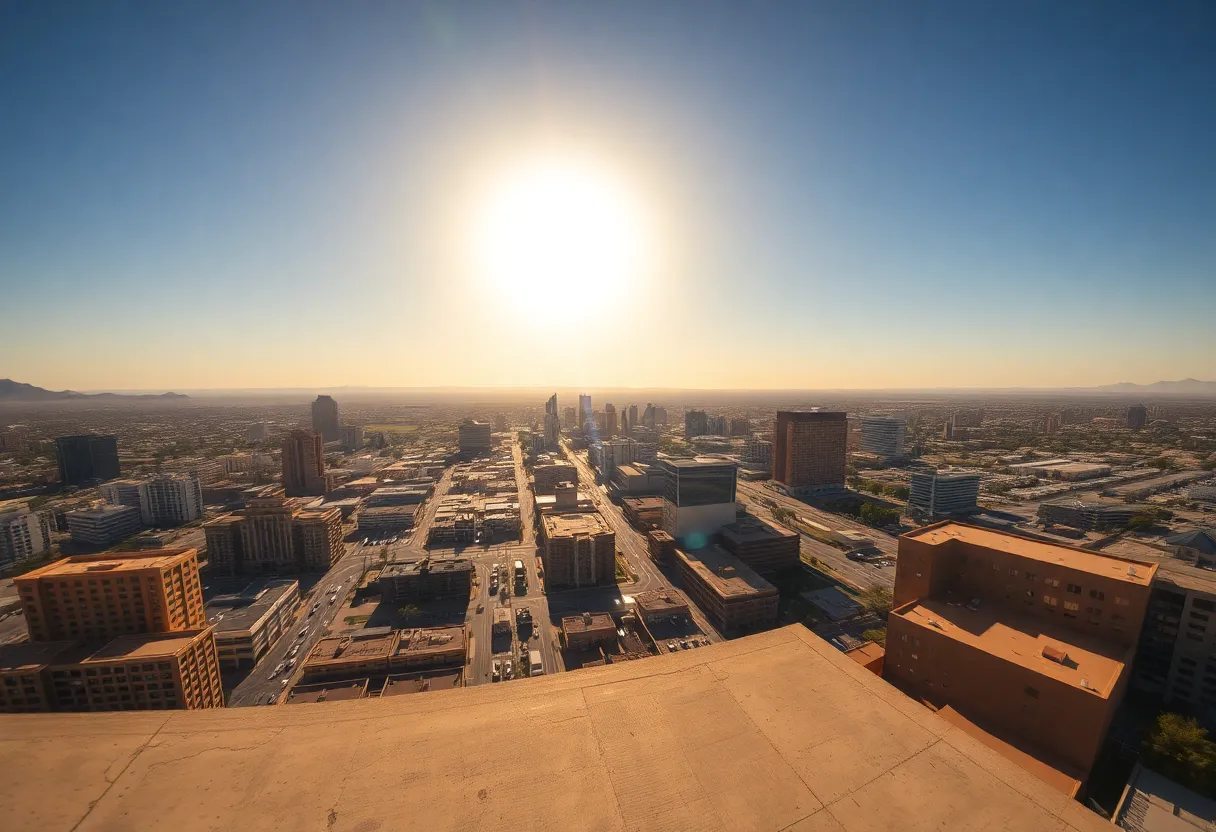News Summary
Phoenix is experiencing an unprecedented heat wave with temperatures soaring between 110 to 112 degrees Fahrenheit. Extreme Heat Warnings have been issued, highlighting serious public health risks amplified by the urban heat island effect. As the city battles against these extreme temperatures, initiatives like the Tree Canopy program are being launched to mitigate heat impact. The ongoing climatic changes signal longer and more frequent heatwaves, increasing vulnerabilities for residents and local infrastructure, notably affecting transportation and public safety.
Phoenix is currently facing an unprecedented wave of extreme heat, with temperatures expected to soar between 110 to 112 degrees Fahrenheit. This situation has prompted Extreme Heat Warnings across the metro area, and First Alert Weather Days have been declared, signaling significant weather conditions to monitor. The region’s prolonged heat has drawn attention to public health risks, urban infrastructure challenges, and long-term climatic changes.
The extreme heat is not just discomforting; it is a serious health threat. Data shows that extreme heat is the leading weather-related killer in the United States, surpassing fatalities from tornadoes, floods, and hurricanes. As Phoenix endures record-breaking temperatures, the impact is exacerbated by warm overnight conditions. Poor cooling at night significantly increases health risks, particularly for vulnerable populations, including older adults, children, and outdoor workers.
The “urban heat island” effect plays a critical role in elevating temperatures within city landscapes. Urban areas like Phoenix tend to retain heat due to surfaces such as concrete and asphalt, which exacerbates the situation by creating a stark temperature contrast with surrounding rural areas. This phenomenon results in higher temperatures, especially at night, which may not cool down as they should, heightening health and safety concerns.
There are indications that the ongoing extreme weather is related to climatic changes, leading to higher baseline temperatures and longer, more frequent heatwaves in the Southwest. Phoenix already experienced significant heat in 2023 with a record-setting 31 consecutive days of temperatures over 110 degrees. Last summer, the city recorded 113 consecutive days where the temperatures surpassed 100 degrees. Projections suggest that urban areas are facing longer and hotter heat streaks, which could affect agriculture, energy demand, tourism, and overall urban livability.
As part of its response to extreme heat, the City of Phoenix is launching a free Tree Canopy program aimed at planting trees to help mitigate heat effects, with applications accepted starting in October. Additional strategies to combat high temperatures include installing water features, enhancing shade in public spaces, using reflective surfaces, and increasing vegetation around urban areas.
The local infrastructure is also feeling the strain from extreme heat conditions. For instance, reductions in air density during these high temperatures can significantly affect aircraft performance at Phoenix Sky Harbor Airport. Pilots are required to carefully consider runway length, aircraft weight, and atmospheric conditions before takeoff when temperatures rise sharply.
This year’s unusual weather patterns, including a unique upper-level disturbance, have also negated typical monsoon flows that could otherwise help alleviate heat humidity levels. Forecasters suggest that some rainfall may arrive later in the week from a low-pressure trough from the Pacific Northwest; however, significant relief is unlikely.
The situation is particularly dire for Tucson as well, where reports indicate that the city is experiencing three times as many extreme heat streaks compared to the 1970s. This alarming trend signals a possible worsening of climatic conditions that require immediate attention and action.
The cumulative effects of extreme heat create a dynamic that increases vulnerability across the region. Not only does it pose serious health risks, but the interaction with other climate issues like drought and wildfires may create compounding challenges for both residents and local authorities. Additionally, the extreme heat has led to the closure of several national parks due to safety concerns, further highlighting the broader implications of this environmental crisis.
As Phoenix becomes a frontline example of climate-related challenges associated with extreme heat, ongoing adaptation and resilience initiatives will be crucial as the community navigates this pressing issue.
Deeper Dive: News & Info About This Topic
HERE Resources
Roosevelt School District Parents Frustrated with Late Buses
Hiking Rescues Rise Amid Phoenix Summer Heat
Multiple School Districts in Middle Tennessee Announce Closures
Catering Workers Protest for Safety at Phoenix Airport
Phoenix Heat Challenges Flight Operations at Sky Harbor Airport
Phoenix Faces Extreme Heat, Record Temperatures Continue
Alarming Rise in Heat-Related Illnesses in Arizona
Phoenix Breaks Records with Hottest August Day
The Importance of Open API in Construction ERP for Phoenix Contractors
Why Mobile Access Is Important for Phoenix Construction Firms
Additional Resources
- AZFamily: Extreme Heat Starts Week Before Storms in Arizona
- ABC15: A Look at the Urban Heat Island Effect and Solutions to Cool the Valley
- ABC15: How Phoenix’s Extreme Heat Impacts Flights
- Weather.com: Phoenix’s Heat Crisis and Climate Change
- AZFamily: First Alert Weather Days Continue Amid Extreme Heat Across Phoenix
- Wikipedia: Heat Wave
- Google Search: Urban Heat Island
- Google Scholar: Extreme Heat Impacts
- Encyclopedia Britannica: Heat Wave
- Google News: Phoenix Extreme Heat

Author: STAFF HERE PHOENIX WRITER
The PHOENIX STAFF WRITER represents the experienced team at HEREPhoenix.com, your go-to source for actionable local news and information in Phoenix, Maricopa County, and beyond. Specializing in "news you can use," we cover essential topics like product reviews for personal and business needs, local business directories, politics, real estate trends, neighborhood insights, and state news affecting the area—with deep expertise drawn from years of dedicated reporting and strong community input, including local press releases and business updates. We deliver top reporting on high-value events such as the Waste Management Phoenix Open, Cactus League Spring Training, and Arizona State Fair. Our coverage extends to key organizations like the Greater Phoenix Chamber of Commerce and Visit Phoenix, plus leading businesses in technology and healthcare that power the local economy such as Intel and Banner Health. As part of the broader HERE network, including HERETucson.com, we provide comprehensive, credible insights into Arizona's dynamic landscape.





